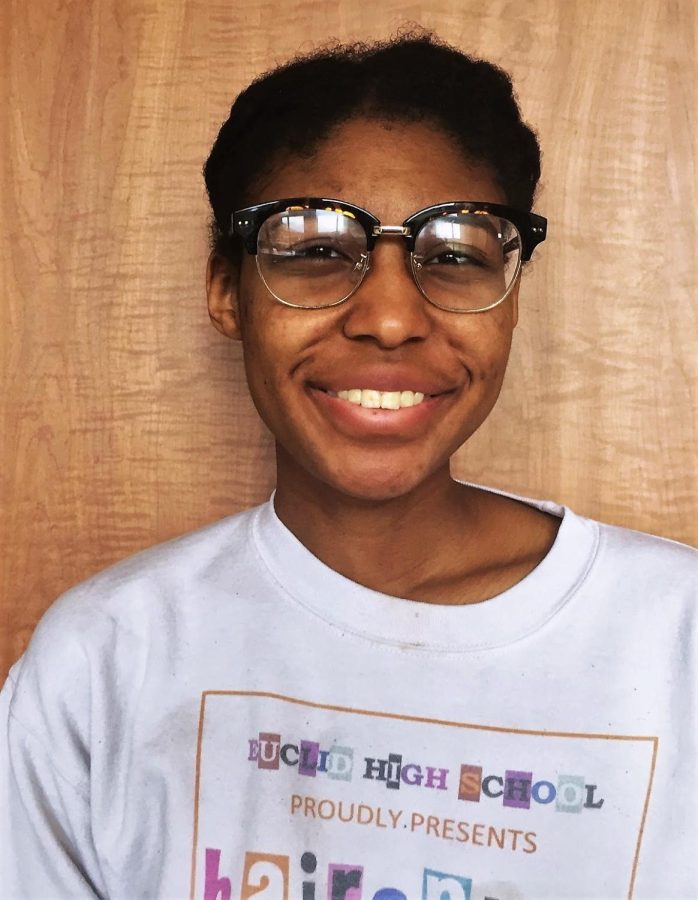Flashes of Pride: Manning
Sophomore psychology major Jordin Manning came out at 12, but has continued coming out ever since.
“I come out multiple times every time I meet new people,” Manning said. “I came out to myself as bisexual.”
Since their initial coming out, Manning has explored different labels and identities. Manning currently identifies as queer or sapphic, gray-romantic and nonbinary.
“I’ve definitely bounced around a lot,” Manning said. “I ended up gaining a lot of access to different sexualities.”
Manning said they started using the internet at the age of 10 and began searching different genders and sexualities soon after.
“Ever since childhood, I’ve been very inquisitive,” Manning said. “I would always look things up like, ‘Is there anything else but bi, straight and gay?’ and there was.”
Manning, who used to major in zoology, said they looked at sexuality in terms of “nature and animals.”
“Since there’s so many different variations of animals and species and even genders in the wild, there has to be more than just gay, straight and bi,” Manning said.
Eventually, Manning realized they are not attracted to men and male-aligned people, and bounced between a few labels until landing on sapphic.
“I’ll either identify as queer or sapphic, which is an umbrella term for people who like women and women-aligned people or trans feminine people in some cases,” Manning said.
Manning, who recognizes that many members of the LGBTQ community view the word “queer” as a slur, will use sapphic and queer interchangeably depending on their audience.
“A lot of people are like, ‘It’s a slur for the older generation,’ but no, there are 15-year-olds who do not like that term at all,” Manning said. “They were and are currently being called (queer), so I’m not going to take that pain away from them just because I identify with it.”
Manning also identifies as gray-romantic, meaning they rarely experience romantic attraction, and nonbinary, meaning they do not identify as male or female.
As the president of Threads, a student organization geared toward people of color within the LGBTQ community, Manning advocates for the awareness and understanding of intersectionality.
“It’s the theory that one’s marginalized identities intersect,” Manning said.
Such identities include class, race, gender and sexuality.
“It’s focused on marginalized individuals to look at their oppression, not just from one lens, but from all their identities and how it can impact one person,” Manning said.
Manning said though intersectionality as a concept is only now coming into schools, it has been around for a long time.
“As an LGBT person, it’s going to impact them because we’re seen as sexual deviants,” Manning said. “As a person of color, we’re seen as sexual deviants and also fetishized and dehumanized in different ways, but that together is just a double whammy.”
Manning said they have never experienced a physical confrontation regarding their sexuality, but they have experienced verbal harassment.
“When I come out, people do avoid me,” Manning said. “It’s stupid, because we’re in the same class, and we’re talking about birds. Let’s look at birds, not talk about how I’m gay.”
Manning said they have also experienced fetishization and invalidation for their sexuality and their relationship. A lot of men have tried to force themselves into Manning’s relationship or have doubted Manning’s sexuality.
“Since I’m older now, I kind of know where I am,” Manning said. “I’m happy where I am.”
Manning, who is currently in a relationship, has confidence in their identity and relationship. They said they no longer allow others to invalidate the way they feel.
“People will say, ‘Oh, well you’re young. How do you know you’re sapphic?’ and I’ll say, ‘Well how do you know that your name is your name?’” Manning said. “Or they’ll say, ‘Oh, relationships don’t last,’ and I say, ‘Yours might not, but mine’s been going pretty fine.’”
Carrie George is the is the administration and diversity reporter. Contact her at [email protected].



